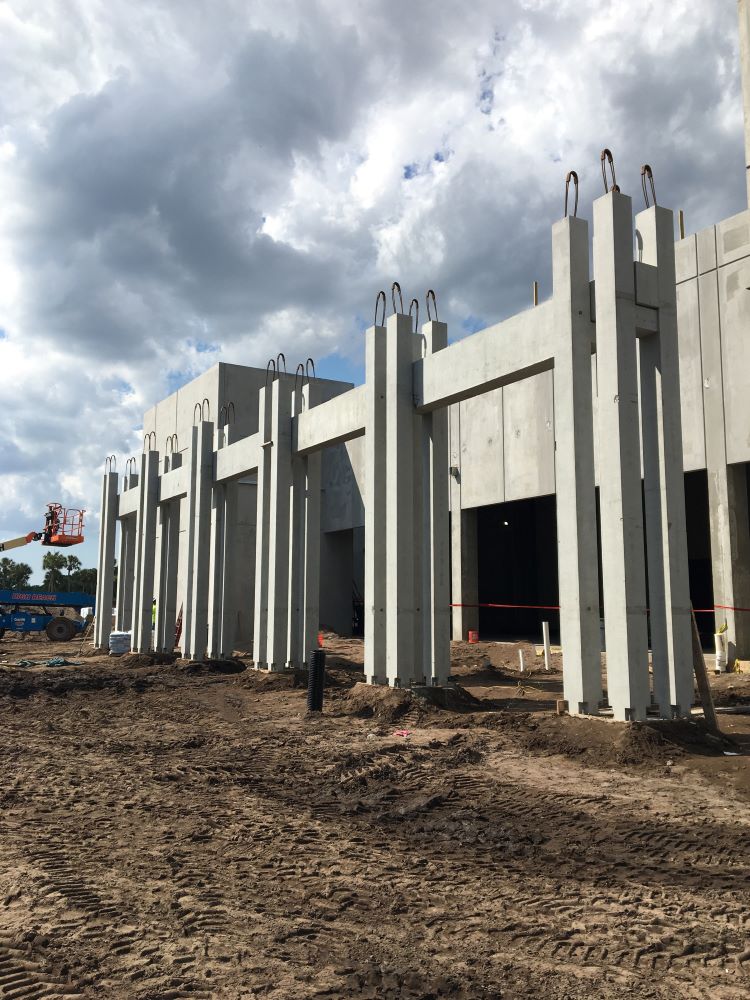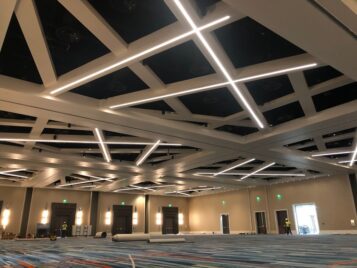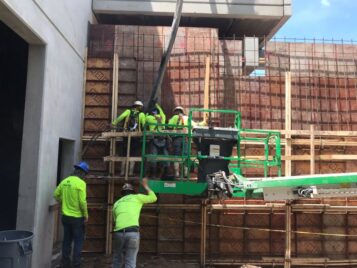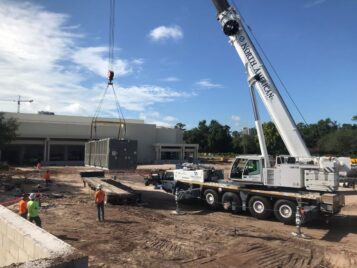
By Ricky Calderon
Hospitality properties undergo renovations, expansions or upgrades often every 3-5 years. Whether it’s to stay competitive in a changing market or because the property is reflagged under a new brand, the goal of the improvement project is usually to attract new guests and maintain established customer loyalty. Simply put, our hospitality clients’ top priority is always guest experience. So, when we begin a renovation or expansion of an existing and operating hotel property, the greatest challenge is planning the work in a way that will deliver the project on time, while also allowing our client to deliver the same level of service to their guests in spite of the ongoing construction.
That challenge is really what sets hospitality renovations apart from other types of projects. Construction, by nature, is loud and not exactly an ideal background activity for hotel guests looking for a getaway. However, the end result, whether a new convention center or individual room upgrades, will eventually make guests’ stays more enjoyable in the future. So, how do contractors balance maintaining a productive schedule to deliver hospitality projects on time, while also ensuring the work doesn’t negatively impact their clients’ revenue or guest experience?
- Constant communication
Communication is key. One of the best ways to ensure construction won’t negatively impact the guest experience is to routinely communicate with the client about their property and event schedule. Some clients have annual conventions or events scheduled, booked and crucial to their revenue. Guests who have attended these events for years have certain expectations for their experience, and it’s our responsibility, as contractor, to deliver that experience despite the active construction going on around them.
Instead of one meeting per week, I often meet 3-4 times a week with hospitality clients to ensure I remain up to date on those critical events that our team needs to plan around. That includes identifying what times and dates we can and can’t make a lot of noise. For example, we could be renovating a space on the other side of a wall where a convention is taking place. We have to sequence our work around the event, which usually means performing critical-path tasks out of traditional building sequences. To do that, I engage our trade partners early to create a functional workflow and communicate with them on a daily, sometimes hourly basis.
Even with the ongoing COVID-19 crisis, we haven’t reduced our communication on any of our projects; we’ve just adjusted the way we communicate. All our meetings are held virtually using web conferencing and online meeting tools.
- Assume multiple roles
While working on active hospitality properties, our work and our team are highly visible. Our project team has to act as though we are an extension of the hotel staff, which means we are working for our client and their guests. While building a new ballroom for the Hyatt Regency Grand Cypress, we had to take over the main parking lot and relocate all guests and staff to an alternate parking. We of course put up fencing and signage, but we also posted several team members at the access points to greet guests and to help them navigate around the construction site.
Construction work, if not properly planned and communicated, can be inconvenient and even frustrating to visitors, so we have to embrace any opportunity to improve guests’ experience. That’s why it’s important to collaborate with all trade partners, communicate with our client often and develop a clear logistical plan that makes guests’ visits as enjoyable as possible, so they’ll want to return to the property again after the renovation is complete.
- Preparation + protection
Safety is a priority on any project, and we have a thorough safety program to eliminate hazards associated with building and protect everyone on our jobsites. But when you’re building on an occupied site—like a busy hotel or convention center—you have crowds of people outside your active site at all times. Between materials deliveries, crane placement, points of access and everyday construction activities, there is a constant concern for public safety—and we have to manage that risk extremely carefully. For example, we’ve adjusted our company-wide safety protocols to adhere to CDC and OSHA guidelines for social distancing and hygiene.
The Hyatt Regency Grand Cypress convention center expansion was a three-phase project, so the schedule and logistics plan were live documents that were constantly evolving. If a new event was scheduled near our work, we had to adapt and rework our schedule to ensure we could keep guests safe, provide clear points of access and egress to their venues and also not interrupt scheduled activities. It’s not an option to simply create a safety plan and follow it through the lifespan of the project. Project teams must remain flexible and willing to cater to their client’s requirements in order to keep guests safe, while also delivering the experience guests expect and have paid for.
Our hospitality clients care about the same thing all our clients do—from staying within the budget to delivering the project fast, and on time. But when they’re renovating or updating their operating properties, our clients also have to consider how to maintain customer loyalty by delivering the same level of experience despite the ongoing construction, which is not an easy thing to do. That’s why we operate as partners with our clients and act as an extension of their brand while we’re working on their property. By staying up to date on hotel events, consistently communicating and adapting our work schedule to keep guests safe, we can help our clients deliver on those expectations by limiting the impact of construction on the guest experience.
Our success isn’t just measured by the beautiful renovation or expansion we build for future guests to enjoy, it’s measured by our ability to perform the work in a way that represents and upholds our clients’ reputation and operation.
Ricky Calderon is senior superintendent at Hoar Construction. For more info, visit hoar.com.






 Join our thriving community of 70,000+ superintendents and trade professionals on LinkedIn!
Join our thriving community of 70,000+ superintendents and trade professionals on LinkedIn! Search our job board for your next opportunity, or post an opening within your company.
Search our job board for your next opportunity, or post an opening within your company. Subscribe to our monthly
Construction Superintendent eNewsletter and stay current.
Subscribe to our monthly
Construction Superintendent eNewsletter and stay current.